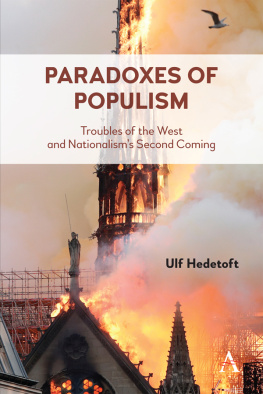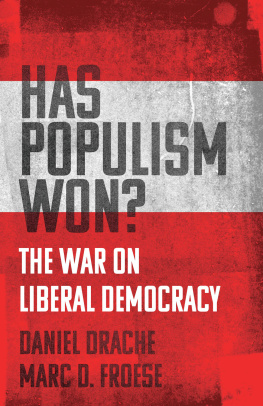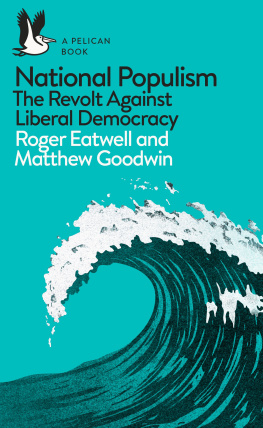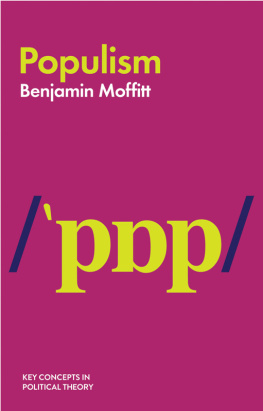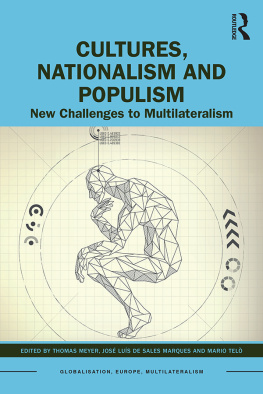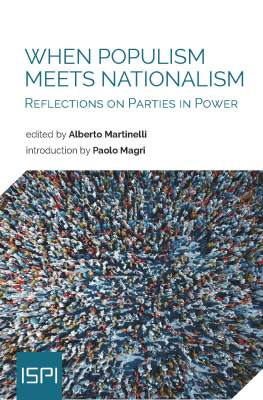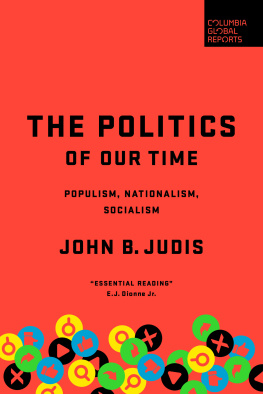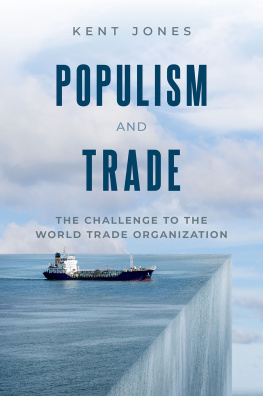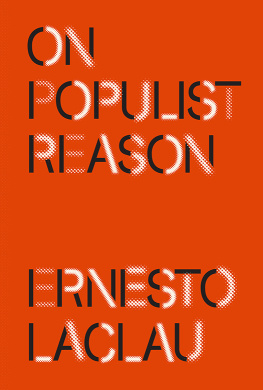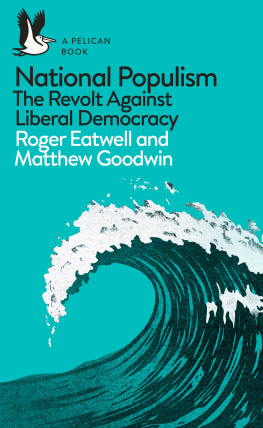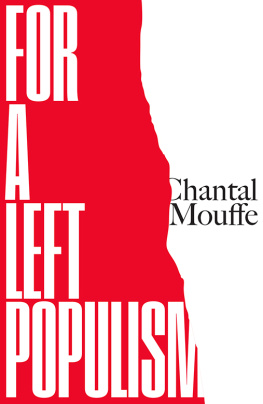Paradoxes of Populism
Paradoxes of Populism
Troubles of the West and Nationalisms Second Coming
Ulf Hedetoft
Anthem Press
An imprint of Wimbledon Publishing Company
www.anthempress.com
This edition first published in UK and USA 2020
by ANTHEM PRESS
7576 Blackfriars Road, London SE1 8HA, UK
or PO Box 9779, London SW19 7ZG, UK
and
244 Madison Ave #116, New York, NY 10016, USA
Copyright Ulf Hedetoft 2020
The author asserts the moral right to be identified as the author of this work.
All rights reserved. Without limiting the rights under copyright reserved above, no part of this publication may be reproduced, stored or introduced into a retrieval system, or transmitted, in any form or by any means (electronic, mechanical, photocopying, recording or otherwise), without the prior written permission of both the copyright owner and the above publisher of this book.
British Library Cataloguing-in-Publication Data
A catalogue record for this book is available from the British Library.
Library of Congress Cataloging-in-Publication Data
Library of Congress Control Number: 2019955629
ISBN-13: 978-1-78527-214-1 (Hbk)
ISBN-10: 1-78527-214-4 (Hbk)
This title is also available as an e-book.
CONTENTS
All over Europe you see the same split, says Frances Economy Minister Le Maire. One part benefiting from globalization, and the other suffering from globalization. Without a drastic fix, nationalism will increase its hold on the continent. The status quo is not an option, he says. The status quo will lead to the end of Europe.
This gloomy prediction is from an article by Vivienne Walt, published by TIME on April 11, 2019. It encapsulates my reason for writing this book about the paradoxes of populism and its implications for the entire Western world. Europe, read the EU, is clearly significant, but populismthe contemporary, most conspicuous variant of nationalismreaches far beyond the borders of that troubled continent, having taken root in the Americas and the Far and Near East as well. Whatever we might think of this phenomenon, there is no doubt that it has wide-ranging implications for the future of the globe, as regards questions of identity, politics, culture and economics too. In this monograph, I present a theory of populism, an analysis of some of its many varieties and the possible consequences for the world we inhabit, from a perspective informed mainly by cultural history and political philosophy.
The manuscript was written over a six-month period, starting in October 2018 and ending in May 2019, almost simultaneously with the sorry end of Theresa Mays Brexit troubles and the staging of Matteo Salvinis Milan conference on the creation of the European Alliance for Peoples and Nationstwo events that embody the paradoxical, many-headed nature of populism. Brexit tries, so far in vain, to extricate the UK from its ignominious dependence on the Continent, whereas the efforts of its continental partners in crime (having learnt the lessons from the British faux pas) aim to change the EU fundamentally and either remake the organization into a regime consisting of sovereign, ethnically pure nation-states or render it dysfunctionaland thus destroy it. That this objective, too, is riddled with paradoxes, pitfalls and unpleasant surprises for the participating members has so far been overshadowed by their nationalist idealism, their passionate intensity and their moralizing belief of fighting for the rights and identities of their respective Peoples.
My efforts have in no small way been supported by colleagues and students associated with the Centre for the Study of Nationalism and the Saxo Institute at the University of Copenhagen and by many international colleagues as well. They have all contributed invaluable inspiration and thoughtful suggestions. I would particularly like to thank historian Mogens Pelt and sociologist of religion Susanne William Rasmussenas well as three anonymous reviewersfor their helpful and incisive comments on the full draft manuscript, which made me aware of arguments deserving elaboration and connections in need of clarification. I am also indebted to Acquisitions Editor Megan Greiving and the entire staff at Anthem Press for their help with numerous practical matters and, needless to say, for their interest in publishing this book.
Finally, I wish to thank my familyLone, my wife, and my sons Christopher and Mathiasfor stimulating discussions about contemporary politics and, not least, for their love, support and patience, when things got stressful and phrases lacked the necessary precision.
A specter by the name of populism haunts not just Europe but the entire Western world. And as the case is with all specters, it is an oddly elusive being, doing its best to avoid precise description. It is analytically and conceptually hard to catch. Its nature is contested, being variously seen as an ideology, a discourse, a morality or a political strategy (cf. Gidron and Bonikowski ).
It undoubtedly puts on all of these clothes at different points in time and in different settings, precisely like its parent, mainstream nationalism itself.) having risen in political impact and visibility since the turn of the century, in Western and non-Western countries alike. It shares with mainstream nationalism the insistence on the pivotal role of the people, on the importance of national sovereignty, on the centrality of cultural and historical homogeneity and on the division between us as laudable and them as foreign and potentially threatening, whether in the form of immigrants, supranational collaboration or the EU.
However, it also differs from the normal design of nationalism and national identities by adding, to its list of opponents, people and groups normally considered an integral part of the national setupelites especiallyand by placing extraordinary and hyper-moralistic stress on the role of the people as the ultimate umpire and principal referent of the rightful composition and future of the nation-state and its borders. Furthermore, it is not concerned with recognizing other nation-states, nor the international order, but is basically intent on keeping its own territory and population clean, pure and uncontaminated; its borders rigid and unassailable; and its cultural heritage and popular memories proud and protected.
Thus far it may come across as little more than an extreme form of national belongingnationalism run wild so to speaka case for national psychologists or a kind of collective pathology.with ordinary manifestations of nationalism should be approached not as a venture into the classical structures of nation-states and identities but as a disruptive and destabilizing consequence of some of the constituent elements of sovereign nation-states becoming eroded and prized apart by contextual global processes and their agents. Hence, populism in all its varietiesand there are many, as this book will demonstrateis riddled with even more paradoxes and inconsistencies than mainstream nationalism itselfconfusing causes and appearances, realities and fantasies, and turning the world inside-out. This is truly the Second Coming of nationalism, and it has come with a vengeance. It is not really a specter as much as a beast. The Coming of it, however, happens on the background of real problems for millions of ordinary people in liberaldemocratic states. This book sets out to engage with these real-world challenges as well as their political and cultural interpretation in the populist fantasia.

